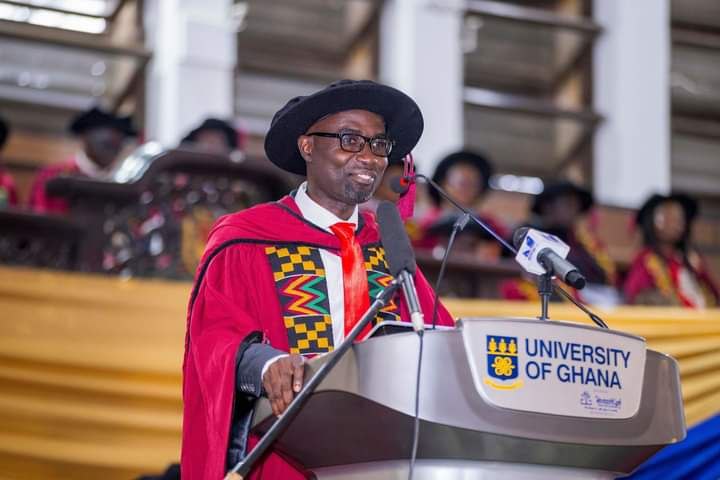Head of the Department of Population, Family and Reproductive Health, Prof. Richmond Nii Okai Aryeetey has emphasized the moral imperative for ensuring healthy child feeding, and the necessity for Ghana to create an enabling environment for young children to receive optimal diets, which he classified as a child’s right.
He made the statement while delivering the third inaugural lecture for the 2023/2024 academic year.
The lecture is themed. “Child Feeding for Human Health and Development: Bridging the Know-Do Gap” is aimed at educating, through research findings, on healthy feeding focused on infants and young children.
He mentioned that Ghana, as the first country to ratify the United Nations Convention on the Rights of the Child, must create a safe environment for young children to receive healthy food, regardless of their parent’s financial capabilities.
“There is also a moral imperative for ensuring that children are fed well. Ghana was the first country to ratify the United Nations Conventions on the Rights of the Child. Articles 24 and 27 of the Conventions on the Rights of the Child explicitly outline the necessity for countries to create an enabling environment for young children to receive optimal diets irrespective of whether their parents can afford it. There’s a role for the state to play. I had the opportunity to review a document that UNICEF published and this document reported that 181 million children around the world were living in what we call food poverty. This simply means that the quality of their diets was poor. In Ghana, it is sad to know that 70 percent of Ghanaian children were classified as food-poor. Young children have rights like us adults. They deserve and must be accorded the right to appropriate nutrition.”
He highlighted the penalties associated with not optimizing child feeding, and its dire effect on national development.
“Optimizing child feeding is the rather high penalty for not doing so. In 2016 the National Development Planning Commission published a report on the cost of hunger in Ghana. The report indicated that suboptimal nutrition of young children was associated with 1.3 million clinical episodes of illness and this cost the nation 360 million Ghana cedars at a time.
So, this is money we are losing because of poor nutrition. 10% of all school repetitions was also attributed to malnutrition and then this was costed at 50 million Ghana cedis.”
To address this issue, Prof. Aryeetey emphasized the importance of breastfeeding and complementary feeding, stressing that young children must be fed on demand, anywhere and anytime, and not on their mother’s schedule.
“I think and I’m sure you would agree with me that this is too high a penalty that we must do everything that we can to avoid paying. How then can we feed our children better? There are two main ways that we feed our young children.
One is breastfeeding and the other is when breastfeeding transitions into a stage where it is complemented with other appropriate foods from age six months and above. We call it complementary feeding. Child feeding is also complex and dynamic, constantly changing.
It requires here also two key actions that we often get wrong culturally. Young children must be fed on demand, anywhere, anytime, and not on their mother’s schedule.”
The Chair of the lecture and Vice-Chancellor of the University, Prof. Nana Aba Appiah Amfo, also emphasized the urgent need to combat the global pandemic of unhealthy diets driven by rapid industrialization and urbanization.
Prof. Amfo commended Prof. Aryeetey for his outstanding contributions to improving child health through his research. She also expressed her wishes for his success as he seeks to venture into youth empowerment in agrifood systems and nutrition.
–
Story by: Vanessa Mensah | univers.ug.edu.gh





